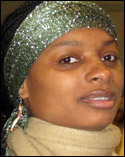An arduous journey and some food for thought
Ugo Edu, a Human Rights Center summer fellow, navigates the streets of Salvador, Brazil to arrive at the far side of town. The feminist activist she meets there has a lot to say about race and racism.
July 19, 2010
SALVADOR, BRAZIL — Trying to navigate the streets of Salvador today provided a reality check regarding my language skills. If my Portuguese were up to snuff, I could have followed strangers’ directions, all along my way, for a prompt, stress-free arrival to my appointment, just as if I were back in Oakland.

Each year the UC Berkeley-based Human Rights Center awards summer fellowships to students from University of California campuses, to enable them to work with human-rights organizations in the U.S. and abroad. Three current Human Rights Fellows including Ugo Edu — a graduate student enrolled in the UCB-UCSF Joint Medical Program — have agreed to share their experiences this summer, with regular updates from the field to be published on the NewsCenter. This is Edu’s final post of the summer.
 Ugo Edu on reproductive choice in Brazil
Ugo Edu on reproductive choice in Brazil
- Watching girl-watchers in a Brazilian airport
- An arduous journey and some food for thought
- Trading votes for sterilizations, a common political tool in northeast Brazil
- Technology troubles, informal conversations, and a curious fact
- From false leads to street thugs, field research has its challenges along with its joys
It wasn’t to be, though not for lack of trying. I left my apartment at 11:45 a.m. for a 2 p.m. meeting. But I kept mispronouncing the name of my destination, and the bus cashier told me to get off at the wrong stop, which meant I had to backtrack for an extra ten minutes while trying to stay dry under light rainfall, dodge fast-moving cars, and climb a steep hill.
When, finally, I arrived on the campus, I gave up on the map and asked a woman for directions. As she answered, some of the words she used were new to me. I continued on, based on what I did understand. I navigated red, wet roads, mud-splashing cars, and the stares and catcalls of male construction workers.
After walking for what seemed to be too long, I asked an older, professorial-looking man whether I was headed in the right direction. He confirmed, instead, that I was going in the wrong direction, having already passed a stairway leading to my destination. Suddenly, the unfamiliar vocabulary I’d noticed earlier took on meaning. I backtracked again; climbed an incredibly steep set of stairs; tried an elevator that didn’t work and then a second, which did; and asked several security officers for directions, holding back tears of frustration.
Finally — irritated, sweaty, under-deodorized, and disheveled — I arrived at guava-colored building, where I met the jewel who awaited my arrival. She received me gracefully, gave me water, let me catch my breath. She inquired who I was and what I was studying (I wanted to know the same about her), and provided me with the names of people and organizations involved in women’s health and the black feminist movement.
But in a short time she also left me with a lot to think about, like the realities of race and racism in Brazil. Many, especially the powerful, subscribe, she suggested, to the notion that Brazil is a racial democracy where institutionalized racism has been abolished. This is a myth and has been revealed as such, yet proves useful as a tool for manipulating the population.
I wonder: Might reproductive rights, as well, be subject to myths, manipulation, and the realities of social inequality? Might a doctor sterilize a woman without her consent and view that as helping her exercise her reproductive rights (without exploring other options)? Might a woman who is an unemployed or underemployed and subject to racial discrimination see not reproducing as her best option, given her circumstances? Where consumption serves as a marker of social status, might getting sterilized and supporting fewer children seem to represent the surest avenue to social mobility?
These are a few of the questions I’m left with after today’s arduous adventure. In the coming days I’m hoping for less rain, better luck navigating the city, and success at setting up and conducting more interviews on women’s reproductive options.
About Ugo Edu

Ugo Edu was born and raised in southern California, the oldest daughter of Nigerian immigrants. After receiving her B.S. in physiological sciences at UCLA, her interest in medicine led her to earn a master’s of public health at Morehouse School of Medicine.
Edu wasn’t satisfied, however, with a strictly public-health approach to questions of sickness, healing, and prevention. Instead, personal experiences — and those of African Americans and of fellow children of African immigrants living in the U.S. — nurtured her interest in a medical anthropological approach to such issues. She is currently entering her third year as a medical anthropology PhD student enrolled in the UCB-UCSF Joint Medical Program.
Edu, 29, has a particular interest in Brazil, in part due to its international geopolitical and economic position; her summer research focuses on Brazilian women’s reproductive choices. She trains in Capoeira Angola, the traditional style of the art form.

